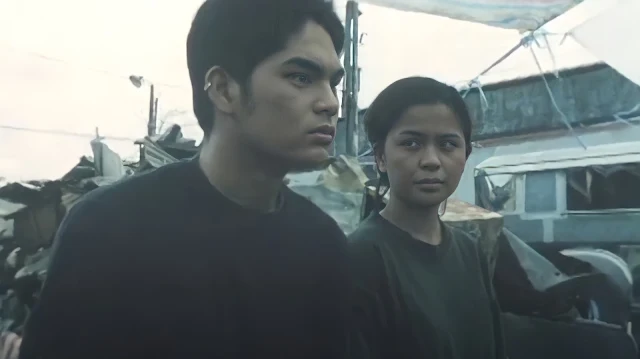Last year there was a small yet significant spurt of worthwhile Filipino films. The mini-renaissance began in earnest (though many would disagree with me) with Tikoy Aguiluz’s Tatsulok, in 1998; it came into full bloom with the Good Harvest Festival, which featured no less than four exciting new films.
There was Ed Leano’s fizzily entertaining Sabado Ng Gabi, Linggo Ng Umaga. (Saturday Night, Sunday Morning-- and yes the title does sound like the Tagalog translation of a well-known film, not the first time it's happened); Jeffrey Jeturian’s solidly constructed Sana Pag-Ibig Na (rough translation: If Only Love), script by Armando Lao; Lav Diaz’s flawed but brilliant Kriminal ng Baryo Concepcion. (Criminal of Barrio Concepcion); Mario O’Hara's inspired Babae sa Bubungang Lata (Woman on a Tin Roof) and insanely imaginative Sisa.
Then nothing. Not a peep, though there were bigger, more ambitious productions: Joel Lamangan’s Sidhi was noteworthy for the performance of Nora Aunor and for Glydel Mercado’s surprisingly fine acting; Erik Matti’s Scorpio Nights 2 showed a talented young director struggling with an incoherent script. Otherwise, silence-- the local film industry, after displaying much promise, slumbered for most of the first half of this year.
Pila Balde finally if belatedly fulfills that earlier promise. It’s another collaboration between Jeturian and the quietly formidable Armando Lao--who, judging from his last two scripts and the amazing Takaw Tukso back in 1986, has to be one of the most underrated screenwriters still active in this industry.
The film-- a multi-story, multi-character portrait of a low-cost housing development-- is a step up from their previous collaboration. Sana Pag-ibig Na had an intriguing premise-- son meets and befriends father’s mistress-- which was developed quietly, with little hysteria or melodrama; Jeturian did a marvelous job of filming on a nonexistent budget-- P2.5 million and ten days’ shooting, where an average Filipino film nowadays costs P12.0 million and takes more than two weeks to shoot. He handled the cast well, especially the women: Angel Aquino as the mistress, Nida Blanca as the wife and mother.
A fairly impressive film, except that Jeturian-- presumably because of budget constraints-- wasn’t able to give the film a real look: it played like a well-made TV movie. To Jeturian’s credit Pila Balde does have a look-- the housing development is a wonder of a location, all tight allies and plywood shanties, a maze for rodents of all sizes to lose themselves in. The shaggier more expansive narrative seems to have liberated Jeturian’s camera as well-- it peeks into corners, sidles along besides the characters, peers over their shoulders to overhear what they’re saying. Mind you, Jeturian doesn’t send the camera into acrobatics-- he’d do Lao’s script a disservice if he did that-- it’s just that there’s care and intelligence in the film’s visuals, if you care to take a closer look.
The cast is bigger, more impressively handled. Ana Capri and Marcus Madrigal make a physically handsome lead couple, but there’s also a thoughtfulness and vulnerability to them that you don’t see in their previous performances. They work well together-- when they’re in bed their chemistry is so natural it doesn’t jar that Madrigal is actually several years younger than Capri.
Helps that Lao gave them real characters to play, that they’re performing in a nicely realized context-- that of a community of upper-lower and lower-middle class families, living in rubbed-shoulders proximity with each other. He throws in a few sharp social observations-- one middle-class character notes that the nearby squatters provide a source of cheap and ready labor-- but does so lightly, without unnecessary preaching.
The ending-- a squatter fire-- is more spectacle than resolution, but what kind of resolution can you have that won’t seem too neat, too obviously structured? The sex scenes tend to stick out, which bothered people who’ve seen the film. They’re actually not bad-- Jeturian stages efficiently, and Capri has nothing to be embarrassed about.
But if a little gratuitous sex helps sell an Amando Lao-Jeffrey Jeturian film, then why not? We’ve succumbed to high-pressure salesmanship from Hollywood often enough; why not embrace a little Filipino production with exploitation roots? By all means, go to Pila Balde for the nudity, then linger long enough to appreciate Capri's fresh acting, Lao's understated writing, and Jeturian’s visual sensitivity. The film has modest virtues and modest pleasures, possesses intelligence and a recognizable soul; superior fare to the brainless, soulless, standardized pap that passes for a Hollywood movie nowadays.
First published in Businessworld 6.11.99


No comments:
Post a Comment